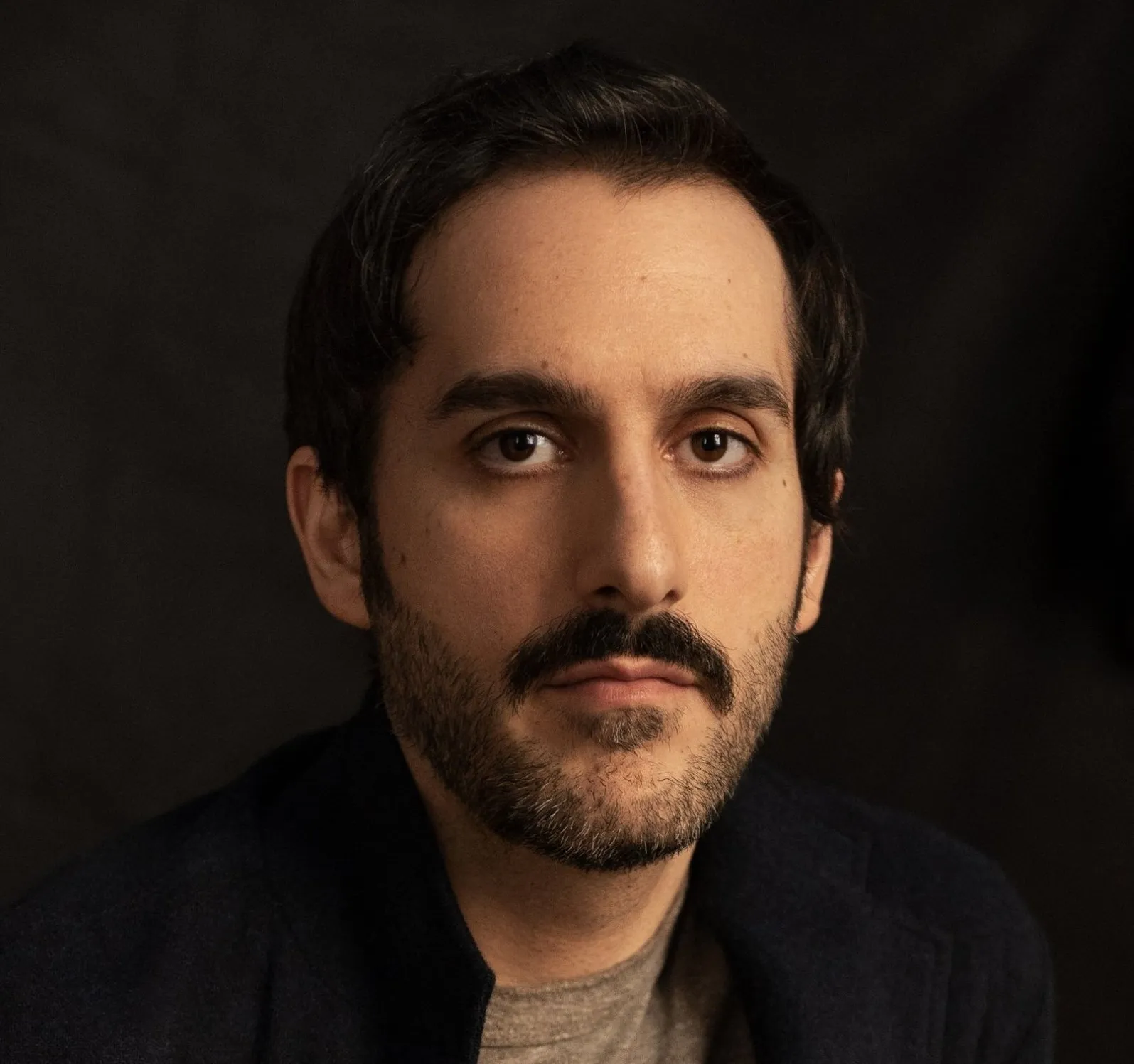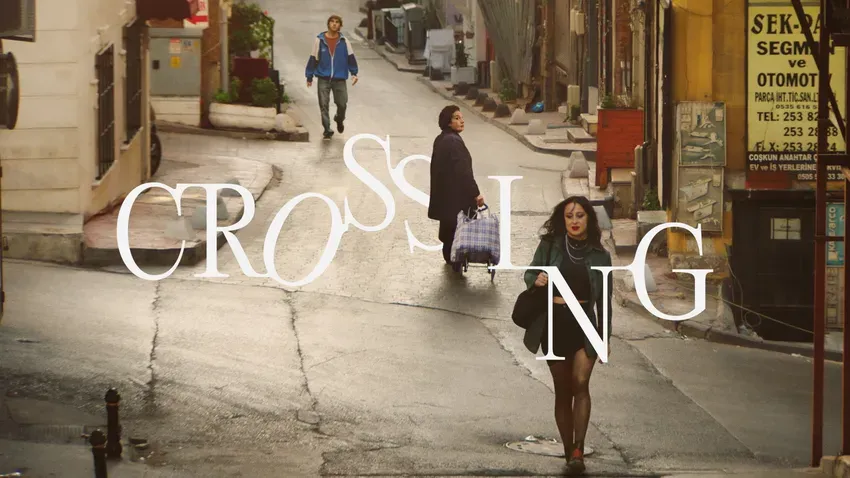I wasn't prepared for how hard the drama Crossing was going to hit me. The latest film from And Then We Danced writer-director and Interview with a Vampire co-executive producer Levan Akin, Crossing has a primary narrative that concerns retired Georgian educator Lia (Mzia Arabuli), who is on a desperate search to find her estranged Transgender niece Tekla. She is joined in her quest by 20-something Achi (Lucas Kankava), a young man desperate to get away from his domineeringly patriarchal older brother. The two of them cross the border into Turkey to search the underground Trans brothels of Istanbul after it is insinuated Tekla may be there.
This in itself is abundant dramatic fodder, but Akin adds more to the meal. The final point of the narrative triangle is Evrim (Deniz Dumanli), a Turkish Transwoman who has just graduated from law school and works for a nonprofit agency attempting to protect the LGBTQIA+ community from continued oppression at the hands of politicians and the police. She encounters unfathomable obstacles in her day-to-day activities while also juggling a romantic personal life in which she is continually made to feel as if she is a deep, dark secret that needs to be kept hidden.
What's extraordinary about Akin's film is, as difficult as much of this may to be watch, the whole enterprise is infused with a layer of empathetic hopefulness that's frequently shattering. All three of these characters are authentically multidimensional, and while their backstories are never truly revealed or examined in any detail, the filmmaker deftly leaves all the pieces about who they are and where they've come from in plain sight for the audience to easily assemble into a finished picture all on their own.
I sat down with Akin over Zoom to briefly discuss his film and the impact he hopes it may have on audiences after they've exited the theater. Here are the edited transcripts from our far-too-brief conversation.

Sara Michelle Fetters: I know that you were inspired to write Crossing by a true story that you were told during the release of And Then We Danced. How did that story blossom into this remarkable and devastatingly empathetic motion picture?
Levan Akin: I think it was several things. When Then We Danced came out, there was a lot of turmoil in Georgia with that film, and a lot of discussion and debate. One of the stories that popped up in one of the newspapers was about a grandfather, and everybody was like, lo and behold, he's 80 and he's friends with his Trans granddaughter. Everybody was like, "How come? Why?" And he was like, "[This is] my granddaughter."
He was so refreshing in that whole debate. [It] was such a divisive discourse and it's super polarizing. It only helps the oppressors to differentiate people. But it's not that black and white. The story of that grandfather was an example of that for me.
I wanted to make a movie about someone who is from the older generation and who has faced something like this. Lia starts off in the film as a woman who is on a mission to do something for her deceased sister. You can feel that she's distanced herself to think life's just something she has to do. Then throughout the course of the film, by meeting people face to face, she starts to come to terms with things in herself.
That was really the idea. That's how it grew.
SMF: For the film, you have essentially three stories going on at once. While Lia and Achi start out together, pretty soon, for however briefly, they go in separate directions. Then you have Evrim, who is out there tackling a variety of problems to the best of her ability. You take all three of these characters on their own journeys until they come together at the top of the triangle by the end. How did you weave all these stories, these three characters from different worlds, so that it feels organic and natural when they do come together at the end?
LA: I loved all three of the characters. Evrim is someone who I met in different shapes and forms when I was in Istanbul doing research, and I was like, I really want to include this person who's so resilient, so optimistic, in spite of this oppressive patriarchy that she faces. She navigates this so elegantly and with such grace. She's just like, no, you are a bigot, I hate you, but I'm going to do my thing. She's educating people. She's taking her space, taking her place, and she was so inspiring to me.
Then you have this kid, Achi, who's also trying to escape patriarchy with his disgusting brother in that home. It's so toxic.
Then you had Lia, who's on her own journey. Someone who we also feel is probably a women who didn't want to subjugate herself to a man. She was never married. She didn't have children.
They're all in the same problem in that they're all trying to escape. To me, that was really what united these characters. Story-wise, I felt like, it's very organic how they meet. I felt that it was very natural and I didn't want to make it too dramatic. I'm glad it worked.
SMF: On top of all of that, you take another big risk, as the film essentially starts right in the middle of the journey for all three of these characters.
LA: Yes. That's true.
SMF: You trust the audience to put together the pieces of what was going on for each of them before the film began.
LA: I didn't want to set things out. It takes too long. I love movies when you're just thrown into something. It just feels lived in and alive. You're like, who are they? Where is she going? Why is she finding her niece? Who is this guy? And then they're on a road trip and you're like, okay, is this a road trip movie? But then the audience is like, no, it's not, because suddenly you're following someone else. I trust the audience to be smart, basically.
SMF: Watching Evrim, I feel like, internationally, universally, we can learn so much from her. How she's facing these situations in her country right now. That hope. That resilience. In the US, we're facing a lot of challenges right now, especially in the Trans community, especially with this upcoming Presidential election. It can feel incredibly scary. What do you think audiences can learn from Evrim?
LA: It's so scary. Yes. I agree. But I learned a lot of lessons from Evrim. A lot of lessons. But I don't really like talking about films in terms of lessons as I don't want my films to feel didactic in that sense. I mean, I want people to watch the movie and just love the characters, and that's enough.
But having said that, I think a big theme for me, with movies, and why I did this one and And Then We Danced, was that we are living in such precarious times. I feel like it's never been darker. We're at the edge of ruin, literally, I feel, and maybe I'm too dystopian, but that's how I feel. So I want to show those small acts of solidarity between people. Those small moments where Evrim zips up the young kid's jacket and she's like, "You're going to be cold." Or when she takes [the children] eating, because we're all in the same boat. All of us. It doesn't matter if you're a doctor or if you're a garbageman, we're all victims of capitalism, which is deeply tied to patriarchy, and there's only a very few elite people that gain from all of us eating each other up like we're doing. Right? That's what I remind myself of when I write these films.
SMF: Partly because you're willing to take this sort of approach to your stories, that you dare to showcase LGBTQ+ characters unapologetically living their lives, you've had to deal with some pretty extreme reactions. With And Then We Danced, you received death threats.
LA: Yes.
SMF: And then the critical and, more importantly, the audience reactions were that the film was a borderline masterpiece, which, in my opinion at least, it is. So that had to be a pretty crazy emotional rollercoaster ride for you.
LA: It was. Yes.
SMF: But it seems to me that challenge wasn't enough for you. You yourself an even bigger one, by actually heading into some of the countries, most notably Turkey, where so many of the more aggressively ugly reactions to And Then We Danced came from. You didn't just set Crossing in Istanbul, you also shot there.
LA: I'm too masochistic. [laughs] But I also have this obsession with spending my time in a meaningful way. I only want to do things where I can educate myself, where I learn things and meet people. I never want to be like, here's a script, it's a good script, let's go out and film it. No. That's boring. I would rather work on something else.
I want to meet people, talk to them, engage with them. We had a lot of people from the Trans community behind the camera, and that informed what we were doing. Our main casting person was a Trans man. He's amazing. He helped us find all these women, many of whom were his friends, and they were all incredible.
Mzia Arabuli, who plays Lia, had never really met any Trans people when she started making the film. Her costume assistant was a Trans girl named Yasmine, and they became besties.
So it was a process also behind the camera. That is important for me. It can't just be what's happening in front of the camera. That can't be the only, how do you say in English? Vernacular. It has to also happen within. It has to happen behind the camera, too. I think that shows in the film.
SMF: What do you want audiences to take away from the film?
LA: A lot of the theme is, when Achi asks Lia, "What would you say to her when you meet her?", when she sees her granddaughter and we actually get to hear those words. Maybe you, someone sitting in the audience, anyone at all, need to call someone and say something nice to them, or vice-versa. That could be nice. I'd like that.
Support the Seattle Gay News: Celebrate 50 Years with Us!
As the third-oldest LGBTQIA+ newspaper in the United States, the Seattle Gay News (SGN) has been a vital independent source of news and entertainment for Seattle and the Pacific Northwest since 1974.
As we celebrate our 50th anniversary, we need your support to continue our mission.
Your contribution will ensure that SGN remains a beacon of truth and a virtual gathering place for community dialogue.
Help us keep printing and providing a platform for LGBTQIA+ voices.
How you can donate!
Using this Link
Text "SGN" to 53-555
Or Scan the QR code below!



